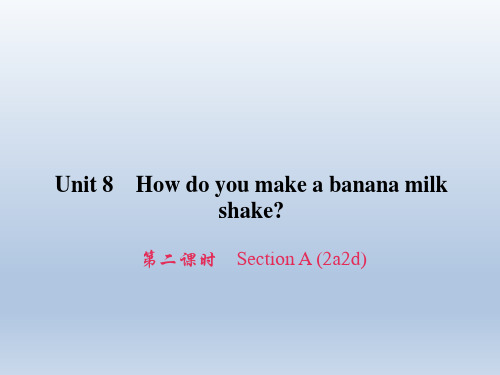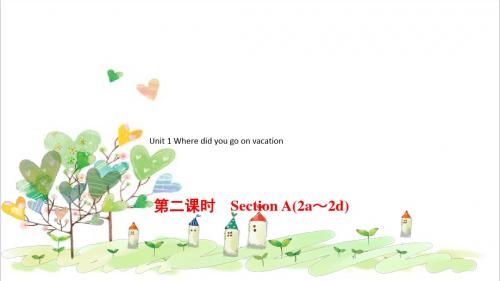第二课时 Section A 2a-2d)
八年级上册英语Unit3 Section A (2a-2d)同步练习(含答案)

Unit 3 I'm more outgoing than my sister .第二课时Section A (2a-2d)一、根据句意及汉语提示填写单词。
1. Jim was more (努力的)than me, so he got better grades.2. This journey to Tibet was so (极好的) and exciting that I want to go there again.3. She got the first place in the writing (比赛).4. (尽管) he is only five years old, he can ride a bike.5. There are two beautiful pictures. (哪一个)one do you like?二、用括号内所给词的适当形式填空。
6. The teacher spoke so (clear)that everyone could understand her.7. Tim ran faster than the other players, so he (win) the race yesterday.8. Sam has five storybooks and his brother only has two. So Sam has(many) storybooks than his brother.9. Some of us took part in the (sing)competition last week.10. Alice isn't as (quiet) as her brother and sister. She never stops talking.11. Kate's schoolbag is newer than (my).12. Maria is a little quieter and (smart) than her sister.13. I think my sister is (hard-working) than me, but she has better grades than me.14. Follow the traffic rules. Because nothing is (important) than life.15. Can't you walk a little (fast)than usual? We will be late for the show.三、根据汉语意思完成句子,每空一词。
人教版八年级下册Unit2 SectionA 2a-2d课件(共13张)

照顾;非常喜欢 (使)变得高兴;振奋起来 打扫(或清除)干净 分发;散发
二.掌握提供帮助的几种句型:
I’d like to… I hope to… I could… I volunteer to… I will do…
1. 抄写总结的单词和短语1-1。 2.抄写2b句子并翻译。 3.根据2a听力,完成2c对话。
sign
notice
lonely
used to
come up with
put off
若跟 人称 代词
hand out call up
,位 care for
置必 cheer up
须放 clean up 中间 give out
Summary
n. 标志;信号 n. 通知;通告;注意v. 注意到;意识到 adj. 孤独的;寂寞的 曾经……;过去…… 想出;提出(主意,计划,回答等)
A: We need to come up with a plan for the City Park Clean-Up Day.
B: Let’s have lunch first. A: No, we need to start now. Clean-Up
Day is only two weeks from now.
I hope to
visit the old in an old people’s home.
I could
give our old books to poor children.
help to plant trees.
I volunteer to
Words and Expressions
sign
【原创新课堂】2016-2017年八年级上册英语(人教)(课件)Unit8第二课时SectionA(2a-2d)

Unit 8 How do you make a banana milk shake?
第二课时 Section A (2a-2d)
►【辨析】how many与how much ①how many是对可数名词的数量提问,后接可数名词复数。 ②how much是对不可数名词的数量提问,后接不可数名词,另外还可 对物品的价格提问。 ►one cup of...意为“一杯……”,是不可数名词数量的表达方式。若要 表达量的复数概念,把计量词变成复数即可。 eg:two spoons of salt两勺食盐 ►First...Next...Then...Finally...这几个副词常用于表示做事情的先后顺序, 意为“首先……其次……然后……最后……”。
一、根据句意及图片提示完成单词。
1 题图)
2 题图)
3 题图)
4 题图)
5 题图)
1.When summer comes,_w__a_te_r_m_e_l_o_n_(_s)_will become very popular. 2.I want to go to the supermarket to buy some ___y_o_g_u_r_t__. 3.Would you please buy some __h_o_n_e_y___for me? 4.There are two ___s_p_o_o_n_s__on the table. 5.My mother put too much __s_a_lt___ into the chicken soup.
三、按要求完成下列句子。 12.—__H_o_w___do you make a sandwich?(根据答语完成句子) —I don't know,please ask mom.She can make it. 13.Please pour some milk into the glass.(改为否定句) Please _d_o_n_'_t p_o_u__r a_n_y__ milk into the glass. 14.Tim ate three bananas yesterday.(对画线部分提问) _H__o_w_ m__a_n_y____bananas did Tim eat yesterday? 15.We need one_cup_of_yogurt.(对画线部分提问) ____H_o_w_ _m_u_c_h__ yogurt do you need?
初中八年级英语上册 Where did you go on vacation(第2课时)Section A(2a-2d)

A:I just 20.s
at home and watched TV.
五、完形填空。 I went to Hawaii(夏威夷) last summer.Hawaii is a very 21
place.Many people go there for vacation every year.The 22 was nice during my stay in Hawaii.It was sunny every day.I 23 many beautiful places and I 24 a good time there.I 25 to the beach.I saw 26 people there.Some played on the beach,some lay on the beach and 27 the sky,and others swam in the sea. Hawaii is the best place 28 water sports in the world.A very popular sport is surfing(冲浪).It's exciting but 29 . People in Hawaii are very friendly.Many people are good at 30 .There,I
—My cousin.
A.What B.Why C.Who CD.When
13.Peter is very friendly and he has
friends.
A.any B.a quite few C.quite a few D.quite few
14.— B did you go last Sunday?
6.Lisa,there are
人教版七年级英语下册作业课件 Unit 5 第二课时 Section A (2a~2d)

二、用方框中所给单词的适当形式填空。(5×3分=15分)
cat leg south Australia kind
6.There is a river in the _so_u_t_h___of the village. 7.—What do you think of these_c_a_t_s_?_ —They are lazy. 8.Many of my classmates come from _A_u_s_t_ra_l_i_a_. 9.My pet dog Jimmy has four short _l_e_g_s__. 10.There are many _k_i_n_d_s_of fruits in the store.
( D )26.A.meet B.help C.ask D.tell ( B )27.A.Where B.Who C.When D.How ( C )zy B.tidy C.smart D.dirty ( A )29.A.Does B.Do C.Is D.Are ( C )30.A.best B.first C.next D.early ( D )31.A.Africa B.China C.Australia D.Thailand ( A )32.A.on B.in C.to D.at ( B )33.A.rules B.names C.dreams D.jobs ( D )34.A.talk B.exercise C.sleep D.show ( B )35.A.keep B.follow C.read D.speak
八年级英语上册 Unit 6 I’m going to study computer science(第2课时)Section A(2a-2d)课件

________ when he grows up? What is Kang Kang going to ________ be 16.His brother practices basketball every afternoon.(用this afternoon替
换every afternoon改写句子) His brother __ ______ __practice ________ basketball this afternoon. is going to 17.Chen Wenhan is going to be a policeman when he's older.(改为同义 句) Chen Wenhan is going to be a policeman when he ______ grows ______. up
一、用所给单词的适当形式填空。
grows 1.He wants to be a pianist when he ________(grow) up.
2.If you want to play soccer well you should practice playing ______(play) it every day.
ቤተ መጻሕፍቲ ባይዱ
二、根据句意用适当的介词填空。
by 6.Do you like the book “Harry Potter”________J .Rowling?
7.Wu Ying likes English very much and she is good________it. at 8.Keep________working hard,and your dream will come true. on
英语人教版八年级上册Unit2SectionA 2a-2d
人教版8年级上册Unit2 第二课时Section A 2a—2d 教学设计一、教学目标1.记忆单词、短语once,twice,Internet,program,full,swing;how often,hardly ever,swing dance,on weekends,three times a week,go to the movies,twice a week。
2.掌握句型:—What does he do on weekends?—He usually watches TV.—How often do you watch TV? —I watch TV twice a week.3.通过听力训练,理解频率副词与动词短语的关系。
4.巩固一般现在时。
二、教学内容1.了解有关业余爱好的知识并学习相关短语和单词。
2.学习一些询问业余爱好活动及表示频率的句型。
3.用频度副词及一般现在时简单谈论周末活动情况。
三、教学重点、难点1.掌握频率副词或短语的使用,谈论课余时间的各项活动,掌握相关句型。
2.一般现在时在不同人称下动词形式及提问的变化。
3.针对weekend activity 的提问,用频度副词回答的答语。
四、教学思路本课教学内容是八年级上Unit 2 第二课时,主要谈论学生的业余爱好,在讲课前做询问,关于学生的周末时间都喜欢干什么,多久做一次此类活动,可以出示图片,或利用表格形式来帮助他们回答。
通过听力训练,复习频率副词,紧跟着的练习达到巩固how often…句型及回答。
最后一环通过对话进行交际训练,分析其中的语法现象。
五、教学准备设计教学PPT,多媒体;学生预先完成2a听力练习。
六、教学过程StepⅠ.RevisionTalk about your own free time activities and lead the students to answer the teacher’s question using “I often…” . [设计意图] 以“weekend activity”为话题展开师生之间的交流,从而激活学生复习已有的一些有关业余活动的词汇,以及频率副词。
人教版七年级英语上册课件:Unit 1 第二课时 Section
第二课时 Section A (2a-2d)
1.—Is he Jack?他是杰克吗? —No,he isn't.不,他不是。 这是一组含有be动词的一般疑问句及其否定简略回答。这种简略回答的构 成常为:“Yes,主语+be.”或“No,主语+be+not.” eg:—Are you Helen?你是海伦吗? —Yes,I am.是的,我是。/ —No,I'm not.不,我不是。 【拓展】如果此句型中的主语为女性单数,用句型“Is she…?”回答为 “Yes,she is./No,she isn't.”如果此句型中的主语为男性单数,用句型“Is he…?”回答为“Yes,he is./No,he isn$.—What ______is_your name? —My name ______is__Linda. 7.Hi!How ______a_re__you? 8.I _____a_m_David. 9.Tom and I ______a_r_e__fine. 10._______I_s___ she Alice?
2.【辨析】no与not no与not都有“不,不是”的含义,但二者用法不同。 ①no可单独使用,常用于对一般疑问句作否定回答,与yes相对。 ②not不可单独使用,它要置于be动司、助动词或情态动词之后,与其构成 否定形式。 【拓展】no还可以作形容词,意为“没有”。 eg:I have no book.我没有书。
一、根据句意及首字母提示填写单词。 1.Her name is Jane.A nd my name is Jill. 2.I'm Sally.H e is Tony. 3.—Is s he Mary? —N o,her name is Grace. 4.—Are you Tom? —Y es ,I am. 5.—W hat'syour name? —My name's Gina.
【原创新课堂】2016-2017年八年级上册英语(人教)(课件)Unit7第二课时SectionA(2a-2d)
( A)10.Because of pollution,more and more plants and animals are in great ________ of dying out. A.danger B.screen C.reason D.culture ( B)11.—I want to take a trip to London this winter. —________.It's a beautiful country. A.I don't mind B.Me,too C.Yes,you're right D.No problem
—More than two hundred.
二、单项选择。
( D )6.What will the future ________ like?
A.is
B.are
C.am
D.be
( C )7.The air ________ here makes me uncomfortable. A.discussion B.relationship C.pollution D.information
三、情景交际:从方框中选择合适的选项补全对话。(有两项多余)(原创 题) A:Hey,Bill!What are you doing? B:12.__F__ A:Really?What will the future be like? B:13.__B__ A:That's too bad.We'll not have enough places to live in,yes? B:Yes,you're right.14.___G_ A:Oh,no!I don't want to live on other planets. B:15.__A__ A:What can I do? B:Very easy.16.__C__ A:OK.I'll tell all my friends to do that.
人教版七年级英语上册教案 Unit 4 第2课时 Section A (2a-2d)
第二课时SectionA (2a-2d)Step1 完成教材2a-2c的任务【操作案例】1.让学生用英语说出2a中的物品,然后两人一组互相提问单词,为听力做好准备。
2.听录音,按听到的顺序为物品编号,集体核对答案。
3.认真观察2b中的图片,再听一遍录音,在2b中找出2a中的物品,并为他们编号,小组内核对答案,教师展示答案。
4.两人一组,就2b中物品的位置,仿照2c的形式来练习对话,并邀请几个学生表演对话。
设计意图:通过听、说训练让学生掌握了方位介词短语的用法,同时学生的口语表达水平在对话练习中得到提升。
Step2 完成教材2d的任务【操作案例】1.学生快速阅读对话,了解对话大意,回答下面的问题:Where'sJack'shat?2.学生认真自读对话,找出对话中表示方位的介词短语,完成后小组成员之间互相交流,然后两人一组互相提问短语。
3.大声朗读2d对话,读熟后与同伴结对练习,分角色表演对话。
4.邀请三组学生来表演对话。
5.小结训练。
( A )(1)—Where'syourpen?—________.A.Onthetable B.Yes,it'sonthetableC.No,it'sniceD.Yes,theyare( B )(2)—Wherearethe________?—________onthetable.A.key;They'reB.keys;They'reC.key;It'sD.keys;It's( C )(3)—Areyourrulersinyourpencilbox?—________.A.Yes,theyaren'tB.No,itisn'tC.Yes,theyareD.No,theyare设计意图:本环节的学习,既能锻炼学生的口语表达能力又对所学的介词短语和询问物体的位置的句型起到复习巩固的作用。
- 1、下载文档前请自行甄别文档内容的完整性,平台不提供额外的编辑、内容补充、找答案等附加服务。
- 2、"仅部分预览"的文档,不可在线预览部分如存在完整性等问题,可反馈申请退款(可完整预览的文档不适用该条件!)。
- 3、如文档侵犯您的权益,请联系客服反馈,我们会尽快为您处理(人工客服工作时间:9:00-18:30)。
A:Hm. And breakfast?
B:18.C A:19.G
B:Uh, eight o'clock.
A:What time do you usually go to school? B:20.A
五、单项选择。(5×5分=25分) 21.— A does Tom watch TV?
—At 8:00 in the evening.
A.When B.What C.What's time D.When time 22.—Where does your brother work? —He works D a radio station. A.on B.in C.of
二、根据句意,选词填空。(5×4分=20分)
6.—What time do you
—At twelve o'clock.
usually have lunch?
7.Tom is a good student.He's never late for school.
8.John alwaystalks in class.We don't like him.
work.
12.他在一家广播电台工作。
He works at a radio station.
13.我工作从不迟到。 I'm never late for work. 14.你通常几点起床? What time do you usually get up? 15.我爸爸通常五点锻炼。 My father usually exercises at five.
D.at
23.I usually read English B six o'clock ______ six thirty in the morning. A.from, at B.from, to C.at, at D.at, to 24.Bob is a good student. He is D late for school.
E.I think it's funny.
F.Where are you?
G.When do you usually take a shower?
A:16.D Rick?
B:Um, I usually get up at 5:00.
A:Five o'clock. Wow! And what time do you run? B:Um, 17.B
四、根据句意及提示写单词。(5×5分=25分) 16.My mother often gets up early in the morning.
17.Twenty and thirty is fifty . 18.Let's meet at the train station .
19.The students usuallyexercise (锻炼) in the morning. So they are healthy. 20.She never (从不) eats breakfast at home.
四、从方框中选择适当的句子补全对话 (其中有两 项是多余的)。(5×5分=25分) A.I usually go to school at nine o'clock. B.At six o'clock. C.Seven o'clock.
D.What time do you uly C.often D.never
25.I have D interesting job. I like ________ job.
A.a, a B.an, a C.a, the D.an, the
一、用所给词的适当形式填空。(5×5分=25分) 1.These books are very interesting (interest).
(下册)
Unit 2 What time do you go to school?
第二课时 (Section A 2a-2d)
一、核心词汇。(10×2分=20分) never 1.从不;绝不 2. 早的 3.五十 4. 工作;职业 5.工作 early fifty job work
6. 电视台;车站 7. ……点钟 8. 晚上;夜晚
2.That's a funny (fun) time for supper.
3.My brother watches (watch) TV every night. 4.He usually exercises (exercise) on weekends. 5.What time does your mother weekends? get (get) up on
station o'clock night
9.奇怪的;滑稽好笑的 funny
10.锻炼;练习 exercise
二、核心词组。(2×3分=6分) 11.一份有趣味的工作 an interesting job
12.在晚上八点半
at eight thirty at night
三、核心句型。(3×8分=24分) 13.—你的广播节目是在几点? —从夜里12点到早上6点。 What_time_is_your_radio_show? From_twelve_o'clock_at_night_to_six_o'clock_in_the_morning. 14.吃早餐的时间真有趣。 That's_a_funny_time_for_breakfast. 15.我上班从来不迟到。 I'm_never_late_for_work.
9.Mike find a job in the club.He likes
it very much.
10.I have much work to do this evening.
三、根据汉语意思完成句子。(5×6分=30分)
11.我爸爸通常下班后吃晚饭。 My father usually eats/has dinner after
